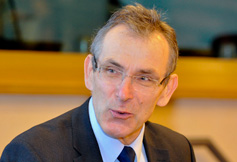Commissioner Piebalgs to visit Burma/Myanmar to pledge new support for democratic and economic reform

From 12–14 February, European Commissioner for Development, Andris Piebalgs, will visit Burma/Myanmar. In response to the impressive reform agenda which began to take shape there after the new civilian Government took office, he will announce a new €150 million assistance package to support democratic reforms and inclusive development in the country.
Commissioner Piebalgs will be the first Commissioner to meet the country's President, U Thein Sein, and will also hold talks with senior government ministers and Daw Aung San Suu Kyi. The Commissioner will travel to Nay Pyi Taw and Yangon to hold a series of meetings, as well as visiting an EU-funded health clinic.
Ministers from EU Member states and the High Representative have welcomed Burma/Myanmar’s remarkable reform process. The visit will give an insight into progress on the ground, in order to further encourage reform and to gauge how the EU can continue to support the change process going forward.
Commissioner Piebalgs will also speak at the Development Policy Options Conference, an event co-funded by the EU to explore how to promote inclusive human development and growth.
Prior to his departure, Commissioner Piebalgs said: "The European Union welcomes the unprecedented developments taking place in the country on core values of the EU – democracy, human rights and the rule of law. The momentum of change in Burma/Myanmar is impressive and the EU recognises the need to do all it can to support the country at this time. More dialogue will help better policies to emerge, more money for development cooperation will promote economic and social development and help reduce poverty."
Additional EU funding to support transition
To respond to the significant political progress in Burma/Myanmar, the EU is making available an additional €150 million for 2012 – 2013. The assistance will initially be devoted to health, education, agriculture and to help displaced people in ethnic areas, with further areas to be explored in line with developments.
Current EU – Burma/Myanmar relations are framed by the EU Council Decision that restricts the scope of development cooperation to a number of sectors and work with UN agencies, international organisations and NGOs. Since 1996, the EU has allocated €174 million in support of the people of Burma/Myanmar. However, the EU has launched a review of this policy.
Background
This visit follows the Foreign Affairs Council (FAC) meeting in Brussels on 23 January, and the European Council Statement of 30 January, where Member States welcomed the remarkable programme of political reform undertaken by the Government and Parliament. This included, among others, the release of a substantial number of political prisoners and ceasefire agreements with ethnic groups. In addition, the Council welcomed the dialogue between the President and Aung San Suu Kyi and changes to the electoral law, allowing the National League for Democracy (NLD) to participate in elections on 1 April.
In response to these reforms, the Council decided as a first step, that the travel ban (visa restrictions) on the President, the Vice-Presidents, Cabinet Members and Speakers of the Houses of Parliament should be suspended. Continued political progress could lead to a further easing or lifting of restrictive measures by the end of April. The European Union wishes to assist Burma/Myanmar in advancing reforms by increasing development assistance to reduce poverty and assist in building necessary capacity of a state.
An EU mission will also open in Yangon in the near future.
For more information















